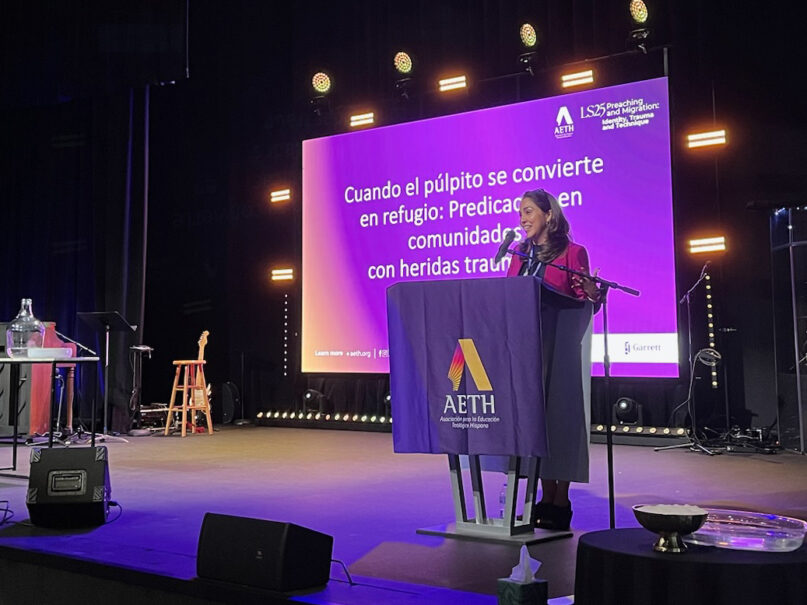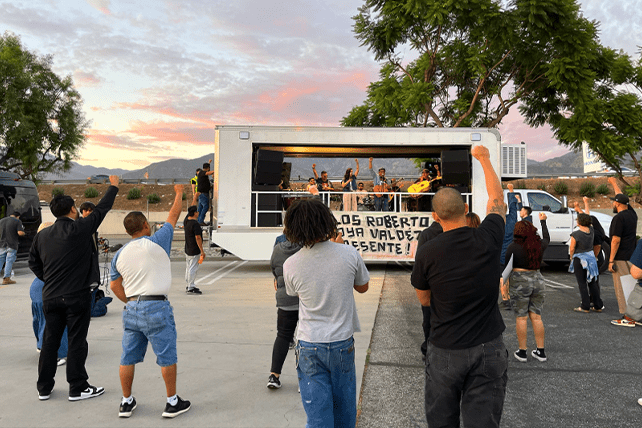MONROVIA, Calif. (RNS) — In a Home Depot parking lot beside a freeway on-ramp in this city northeast of Los Angeles, a woman sang to a small crowd in Spanish over her band’s rocking cumbia rhythm, “How I love my people, for being more than brave.”
Across the interstate ramp, under peach-colored clouds, a collection of tiny crosses memorialized the spot where Carlos Roberto Montoya Valdez, a day laborer who used to come to the Home Depot to find work, was struck and killed by an SUV as he ran from U.S. Immigration and Customs Enforcement agents.
The crowd had come 40 days after Montoya’s death for an Oct. 10 vigil. Pablo Alvarado, co-executive director of the National Day Laborer Organizing Network, spoke about his childhood memories of the impact of Catholic Archbishop Óscar Romero’s role as the “moral voice” of El Salvador during the country’s military dictatorship and civil war. Romero, who was assassinated while celebrating Mass in 1980, became a Catholic saint in 2018.
Alvarado told the crowd, “I don’t know, but I don’t feel that that person exists in this moment in our country. We don’t have that strong of a moral voice. And we all know what happened to Bishop Romero. And in the absence of an individual like that, then who has to be that moral voice?”
But Christian leaders are working to strengthen this kind of moral voice, using Romero as a model. At Life Pacific University, in San Dimas, the Asociación para la Educación Teológica Hispana (Association for Hispanic Theological Education) was meeting at a preaching and migration conference from Oct. 9 to 11. Alma Tinoco Ruiz, assistant professor of homiletics and evangelism at Duke Divinity School, urged preachers to draw on Romero’s preaching to help their communities navigate trauma.
“What made Romero such a prophetic and pastoral preacher was his ability to clearly hear the voice of God both through Scripture and through the people who suffered and to let both illuminate each other with the light of Christ within them,” Tinoco Ruiz said in her Spanish-language keynote.

Alma Tinoco Ruiz addresses a meeting of the Asociación para la Educación Teológica Hispana, Oct. 10, 2025, at Life Pacific University in San Dimas, Calif. (RNS photo/Aleja Hertzler-McCain)
The conference often took up the question of how best to preach and pastor congregations traumatized by President Donald Trump’s mass deportation policy. Tinoco Ruiz called on the 250 attendees to be “empathetic witnesses, to speak with tenderness and courage, naming the suffering but also the promises of God.”
In one panel, Harold Segura, director of faith and development for World Vision in Latin America, urged preachers to take into account children who are listening to sermons, saying they can interpret teachings in a very literal way. That preaching can “end up adding more pain” to children’s pre-existing trauma, Segura said.
He advised pastors to spare children violent theologies that depict a punishing God, as they might not know how to make sense of why they are suffering.
Tinoco Ruiz also told her keynote audience that homilies should be instruments of healing, not only for present-day harms but historical wounds from colonization, slavery, natural disasters and human conflict that scientific research says may be passed on genetically to following generations. “Hidden below the resilience, the wounds remain and healing continues to be necessary,” she said, but “the body will pass us the bill.”

